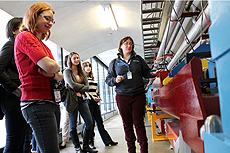Undergraduate women in physics visit Fermilab
 |
Fermilab docent Toni Mueller shows students a model of a beamline. The Midwest Conference for Undergraduate Women in Physics coordinators offered participants a tour of Fermilab or Argonne. Photo: Amanda Solliday |
Seventy female college students in hard hats descended into the MINOS cavern, walked through the Tevatron tunnel and explored the Linac beamline as part of the Midwest Conference for Undergraduate Women in Physics Friday, Jan. 17.
"The first time I toured Fermilab, it wasn't what I was expecting at all, even after two years of college-level physics," said Savannah Thais, a senior physics major at The University of Chicago. "I had no idea what it was like to do science all day, every day."
Thais attended the 2013 conference and this year volunteered for the local organizing committee. She hopes participants will see the scientists and engineers at national laboratories as potential role models. The conference organizers also aim to provide female physics students a chance to connect with each other.
"Many times, especially at smaller colleges and universities, there are not many women in physics departments. You might be the only girl in your classes," Thais said. "So we hope the participants can meet other female undergrads who share some of the same goals as they do."
Sahar Jalal, a senior math and physics double major at Grinnell College, says she enjoys learning about the large-scale research projects.
"I didn't know there were so many international collaborations at Fermilab," Jalal said during lunch at Wilson Hall.
In between tour stops, 28 Fermilab scientists, engineers, science writers and docents met with students over the noon meal.
The Conferences for Undergraduate Women in Physics rotate each year to different sites nationwide. The University of Chicago hosted this year's Midwest conference, partnering with other area universities and institutions.
The location allowed organizers to offer a Fermilab tour for the first time. The 250 Midwest participants could also choose to visit Argonne, while students at the other regional conferences visited Berkeley, Brookhaven and Livermore national laboratories.
Particle physicists play a particularly active role in the conferences, said Kevin Pitts, a physics professor at the University of Illinois. He notes the two national co-chairs and three Midwest organizing committee members work in particle physics.
Sam Zeller, a Fermilab staff scientist on the local committee, welcomed the chance to offer young scientists a glimpse into the life of a researcher.
"Seeing a national laboratory was a big thing for me as an undergraduate," Zeller said. "It made me think about physics as a career, so it's nice to give that opportunity back to the next generation of students."
—Amanda Solliday
|